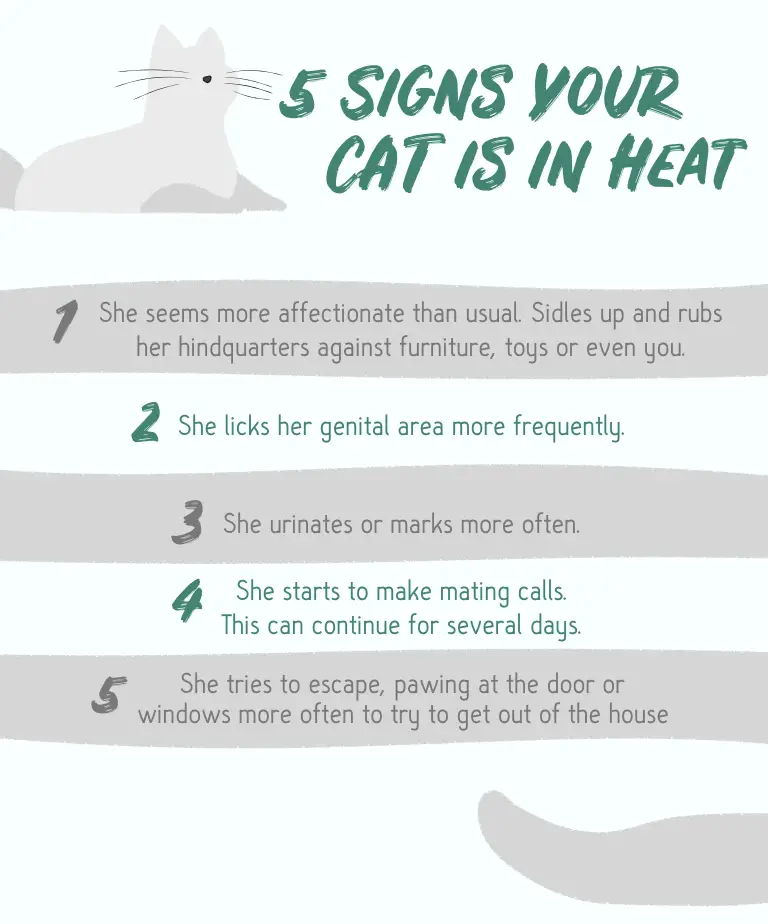It is generally safe to spay a cat in heat. However, it may involve more risks and complications.
Spaying a cat in heat can be done, but it presents certain challenges. The procedure may be more complex due to increased blood flow to the reproductive organs. Vets often recommend waiting until the heat cycle ends to reduce risks.
If immediate spaying is necessary, a skilled veterinarian can perform the operation. It is crucial to consult with your vet to understand the potential risks and benefits. Spaying helps prevent unwanted litters and can reduce the risk of certain health issues. Always prioritize your cat’s health and well-being by seeking professional advice.
What Is Spaying?
Spaying is a surgical procedure. It removes a female cat’s ovaries and uterus. This prevents her from getting pregnant. It also stops her from going into heat. The main purpose is to control the cat population. Spaying can also help with behavior issues. It makes female cats calmer and less aggressive. This procedure also reduces the risk of certain diseases. Spaying can improve a cat’s overall health and lifespan.
Many people think spaying a cat in heat is dangerous. This is not true. It can be done safely by a vet. Some believe spaying makes cats lazy. This is also a myth. Spayed cats are often healthier. Another myth is that cats need to have one litter first. This is false. Cats do not need to have kittens before being spayed. Spaying at any time is beneficial.
Cat Heat Cycle
Cats go through several phases in their heat cycle. The first phase is called proestrus. In this phase, the cat may become more affectionate. Estrus is the next phase. During this phase, the cat can mate. The third phase is metestrus. This is when the cat’s body prepares for pregnancy. The final phase is anestrus. In this phase, the cat rests before the next cycle.
Cats show many behavioral changes during heat. They may become more vocal and meow loudly. Some cats may roll on the floor and rub against objects. Restlessness is also common. Cats might try to escape the house. They may also spray urine to mark territory. These behaviors can be challenging for cat owners.
Risks Of Spaying In Heat
Spaying a cat in heat can cause increased bleeding. The blood vessels in the uterus and ovaries are larger. This makes surgery more challenging for the vet.
Complications can arise during surgery. The cat’s tissues are more fragile and prone to tearing. This can lead to longer recovery times and more pain for the cat. It is important to consider these risks before deciding to spay a cat in heat.
Benefits Of Spaying In Heat
Spaying a cat in heat can offer immediate relief from behavior changes. Cats in heat often become agitated and restless. They may yowl loudly and try to escape. Spaying stops these behaviors quickly. It also reduces the risk of attracting male cats. This can help keep your home more peaceful.
Spaying in heat prevents unwanted pregnancy right away. Female cats in heat are ready to mate. Spaying stops the chance of kittens. This can help control the pet population. It also saves you from the responsibility of caring for more cats. Early spaying can improve your cat’s health.
Veterinarian Perspectives
Veterinarians have mixed feelings about spaying cats in heat. Some believe it is safe and effective. Others worry about increased risks. Blood flow to the uterus is higher during heat. This can make surgery more complex. Experienced vets can handle these challenges. They know how to control bleeding and manage complications.
Studies show varied outcomes. Some cats recover well after spaying in heat. Others face complications. Bleeding and infection are common concerns. One study found a 10% increase in complications. Another showed no difference in recovery time. Each cat is different. Their health and age can affect the outcome. Always consult with a trusted vet. They can give the best advice for your cat’s situation.
:strip_icc()/CatAtVet182703507-56a9c2555f9b58b7d0febeb2.jpg)
Credit: www.thesprucepets.com
Preparation For Spaying
Ensure your cat is healthy before surgery. Visit the vet for a check-up. Make sure vaccinations are up to date. Discuss any concerns with the vet. Prepare a quiet recovery space at home. Arrange for transportation to and from the vet. Follow the vet’s advice on pre-surgery care.
Stop feeding your cat 12 hours before surgery. This helps avoid complications. Provide water until 2 hours before the procedure. Hydration is important for recovery. After surgery, follow the vet’s feeding instructions. Your cat may need soft food. Keep fresh water available at all times.
Post-surgery Care
Watch your cat closely after surgery. Keep her in a quiet place. Make sure she eats and drinks. Check the incision site daily. It should be clean and dry. Look for redness or swelling. Contact your vet if you see anything unusual.
Your cat might seem tired after surgery. This is normal. But some signs need quick attention. Vomiting or diarrhea is not normal. Watch for trouble breathing. If she seems very weak, call your vet. She should not have a high fever.

Credit: bettervet.com
Alternatives To Spaying In Heat
Timing the surgery can be very important. Wait until your cat is out of heat. This makes the procedure safer. Spaying in heat can lead to more bleeding. Your vet can help you choose the right time. It is good to monitor your cat’s heat cycles. This helps in scheduling the surgery.
Hormonal treatments can delay heat cycles. This can make spaying easier. Medications can be given by your vet. These can help manage the symptoms. Hormonal treatments are not a long-term solution. They should be used with caution. Always follow your vet’s advice when using these treatments.

Credit: bettervet.com
Frequently Asked Questions
Is It Okay To Spay A Cat While In Heat?
Yes, spaying a cat in heat is possible. However, it may be riskier and more expensive. Consult your veterinarian.
Why Do Vets Charge More To Spay A Cat In Heat?
Vets charge more to spay a cat in heat because the surgery is more complex and time-consuming, increasing risks and costs.
How Do I Get My Cat Out Of Heat?
Spay your cat to stop heat cycles permanently. Consult a vet for advice and scheduling. Keep her indoors and comfortable.
How Long After Heat Can You Spay?
You can spay a dog 8-12 weeks after her heat cycle ends. This ensures optimal health and recovery.
Conclusion
Spaying a cat in heat is generally safe but can pose additional risks. Always consult your veterinarian for advice. Proper timing and expert care ensure your cat’s health. Understanding the process helps make informed decisions. Prioritize your cat’s well-being by staying informed and vigilant.
Your furry friend deserves the best care possible.

Hello, this is Frank Swanson, the owner, and operator of Pet Info Hut. I created this website as a way to share my love of pets with the world. I have over 7 years of experience working with animals, and I have a passion for helping people care for their pets. I hope that you find my website useful and informative. Thanks for visiting!
